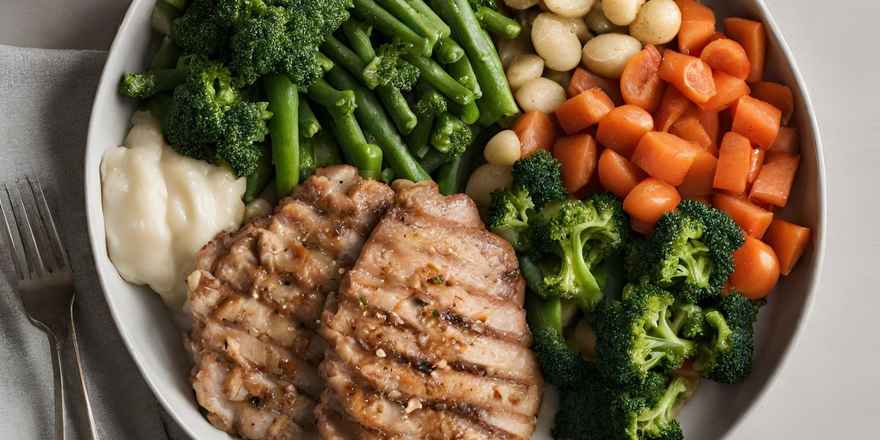Mastering Meal Planning: A Guide to Thriving with Wholefoods

Meal planning is something close to my heart. This may sound a bit strange, but it is true 😊. The reason why is multi-faceted, firstly I am passionate about wholefood and the positive impact they have on human health and the planet. Secondly, I feel very strongly about helping all people access wholefoods and achieve practical skills in how to include nutrient dense foods and learning skills to use in food as medicine. Finally, I grew up in a very large family that wasn’t flush with money and if it wasn’t for effective wholefood meal planning, we would not have flourished as we did. I feel in our current climate of overconsumption and economic stress, the perception of eating wholefood is that it’s financially out of reach for most. I don’t believe that has to be the case. Keep reading as I would love to share with you my knowledge, experience, and help you work towards achievable solutions.
Food is our primary need for physical survival, good quality food encourages us to thrive. In my clinical practice I see all too often people struggling when it comes to eating well and including wholefoods into their meals. I see people surviving when it comes to food not thriving.
Meal planning is an important foundation to include into your life when it comes to making positive changes to your diet. Once you get into the routine of meal planning it can give you more freedom, connection with your family and friends and less stress at mealtimes. It just takes time and practice.
A meal plan is simply a map for the week ahead and even if it is not ideal it is better than nothing. It’s not about perfection but rather getting it out of your head so you aren’t wasting energy stressing about what’s for dinner and it gives yourself a bit of structure. Structure allows you to save money, reduce stress, eat better and ultimately feel well.
I would encourage you to include everyone in the family and this is best done as a family exercise where possible. It is here children learn to come together for the common good, share the responsibility of everyday life and most importantly, learn how to eat and how to cook. This is how we build a strong food culture.
So, lets get to the core of the issue, how do I go about meal planning for the week ahead? Well, first up lets begin with the end in mind. visualize what a balanced wholefood plate would look like. When meal planning it is ideal to focus on achieving two meals a day that consist of half the plate of above ground vegetables, quarter of the plate protein, quarter of starch grains, fruit or below ground vegetable.
.jpg)
Now that we have the end in sight and understand what a balanced plate looks like, let’s get into what foundation and habits that will get you there consistently. Here are my five lifelong and professional tips is making mealtime easier;
1. Food Foundations
There are 8 actions to take when creating the food foundation. These steps are best done weekly and monthly in order to create highly nutritious meals with little effort. When you get into the habit of understanding them, creating variety within these 10 food basics you will be set for any occasion. I cover these 8 actions in detail in my Meal Planning workshop.
Primary proteins, one pot meals, stock or broth, salad, vegetables or grains are examples of the 8 foods foundations to learn and incorporate into your meal planning schedule. I would always start with brain storming what you are currently eating and what you could expand on and include or at least try for the first time.
For example, primary proteins are foods that consist of meat, fish, legumes, egg and other poultry. They are to consist of around ¼ of your plate or equivalent to your palm size. Start by writing a list of the primary proteins you have cooked in the last 7 days and what meals where they in? Are you getting variety in your primary protein choices? Tip – choose one type of primary protein source a week and rotate each week to create variety. Cooking a roast once a week and using it for your lunches is a simple way of making sure you save time, money and eat well. All you need to co-ordinate is your carbohydrate such as legumes, vegetable, salad or rice.
One pot meals, these are meals that you can cook in a slow cooker, baking dish or in a large saucepan on you cooktop. These meals incorporate your primary protein along with starch vegetable or legumes. One pot meals are great to make ahead of time and create a base for lunches and dinners. For example, if you made Turmeric Beef Stew, you can add steamed vegetables and salad on the side to create a balanced whole food meal for dinner. In addition you could add some of the turmeric beef stew meat and add this to a wrap along with salad green and other vegetables for lunch. One pot meals can be made as double batches and frozen.
Salad, vegetables can be prepared days in advance, washed, cut and spiralised ahead of time. Often, I will wash and prep my salads in an airtight container for the working weeks and all I need to do is add my primary protein and dressing. My lunch times are quick, filling and I avoid those energy slumps in the afternoon.
2. The Essentials
There are so many recipes available and at times it can be very overwhelming deciding on what to eat and cook. My advise is to keep it simple to begin with. Here are my essentials to get you going;
- Choose 2-4 meal options per meal. Make a list of what you do now and adjust to make it healthier if needed, or include more variety if you have less than 4. For example, Breakfast – overnight oats, banana bread, savoury mince on toast, poached egg.
- Aim for two nutritious meals a day that resemble the balanced wholefood plate. The rest will follow.
- Eat seasonally. Start becoming aware of the seasons and what food is available. Buying in season often means affordable food and better for the planet and farmers.
- Snacks & Treats. Explore and start making wholefood treats so you can celebrate and satisfy your taste buds without the nasties.
- Easy Meal. Eating on the run or when you are not prepared can create unnecessary chaos. Life is not perfect. Be realistic, if you are stuck buy the BBQ chook and make a salad or steamed vegies at home rather than the hot chips. Think creatively.
- Behaviours. Habits and behaviours around eating are just as impactful as eating wholefoods. The timing of eating, also known as window of eating is best to be around 10 hrs most days. This allows our body to flow with our set circadian rhythms in enabling healthier outcome. I cover this and other habits to include in my course.
3. Co-Ordinate
Meal planning needs to fit and co-ordinate into your life. Look at yours and your families weekly and monthly routines, such as work hours, before and after work/school activities, weekend activities and plan your meals around these. I know I would plan a month ahead when I was busy running kids around, managing a busy work life.
Make a list of all the meal options that you can incorporate and divide them into each season. This allows you to incorporate better nutrition, less monotony and creates enjoyment around food.
4. Success
Setting yourself up for success obviously makes life easier. When it comes to meal planning, there are essential kitchen utensils, pantry and freezer stockist that creates a better flow and over time you will find you will spend less as your need for packaged foods decreases.
Allocating time to meal prep is non-negotiable. The time needed depends on your family size and your weekly routines. Each week allocating 2 hrs in the kitchen to meal prep for the week and once a month allocating a few hours to make bulk meals, stocks & broth and wholefood treats create a happy healthy family and friends. Remember cooking to music, doing with others or even watching your favourite series is all doable in the kitchen!
5. Learn
If you are new to meal planning, it is all about learning new habits, learning new recipes, and creating a space to connect with one of our essential needs – wholefoods. We are all unique and all have different experiences with food, abilities in cooking, understanding of nutrition and what a balance diet looks like. This is why I have designed practical and educational workshops to assist people in taking positive steps towards a healthier relationship with food and food as medicine. If you are wanting to learn how to bring wholefood into your life, or if you are bored with your repetitious meals each week or if you are not naturally organised then join me in my Meal Planning Workshop. We have loads of recipes individually videoed for you and educational modules to help you create stress free meals times.


0 comments
Leave a comment
Please log in or register to post a comment